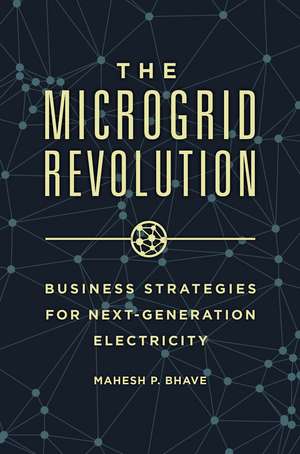The Microgrid Revolution: Business Strategies for Next-Generation Electricity
Autor Mahesh P. Bhave Ph.D.en Limba Engleză Hardback – 10 oct 2016 – vârsta până la 17 ani
Preț: 356.01 lei
Preț vechi: 481.73 lei
-26% Nou
Puncte Express: 534
Preț estimativ în valută:
68.14€ • 74.04$ • 57.28£
68.14€ • 74.04$ • 57.28£
Carte tipărită la comandă
Livrare economică 21 aprilie-05 mai
Preluare comenzi: 021 569.72.76
Specificații
ISBN-13: 9781440833151
ISBN-10: 144083315X
Pagini: 216
Dimensiuni: 156 x 235 x 14 mm
Greutate: 0.52 kg
Editura: Bloomsbury Publishing
Colecția Praeger
Locul publicării:New York, United States
ISBN-10: 144083315X
Pagini: 216
Dimensiuni: 156 x 235 x 14 mm
Greutate: 0.52 kg
Editura: Bloomsbury Publishing
Colecția Praeger
Locul publicării:New York, United States
Caracteristici
Synthesizes seemingly disparate concepts from the telecom and electricity industries with business strategy and policy and regulatory issues, allowing readers to see the tremendous opportunity at hand in clean electricity technologies
Notă biografică
Mahesh P. Bhave, PhD, is a visiting professor of strategy, Indian Institute of Management (IIM), Kozhikode, Kerala, India, where he has taught for more than four years.
Cuprins
PrefaceAcknowledgmentsIntroductionAbbreviationsONE: Centrifugal Revolution: Strategies for Next-Generation ElectricityTWO: Microgrids for Autonomy: Local Generation, Local ConsumptionTHREE: Toward Off-Grid Campuses: The Design ChallengeFOUR: Microgrids: Common Intersection between Developed and Emerging EconomiesFIVE: Divest and Fractionate for ValueSIX: Define and Auction Market BlocksSEVEN: Entrepreneurial Opportunities in Electricity 2.0EIGHT: Electricity Most Glamorous: The Enernet of Things (EoT)NINE: Functional, Therefore Dysfunctional, Business SchoolsTEN: Wrapping Up: Microgrids EverywhereAPPENDIXESAppendix 1. Microgrid Alliance: Policy AdvocacyAppendix 2. Course Outline: Strategic Management of Energy SystemsAppendix 3. Select Microgrid-Related Articles by Mahesh P. BhaveNotesBibliographyIndex
Recenzii
No brief review can convey the richness of the canvas of opportunities Bhave paints. . . . Bhave's writing is vivid and entertaining, interspersed with illuminating anecdotes and examples. He declares correctly that 'this is an accessible book meant for the concerned or interested layperson.' But electricity specialists will also find it enlightening-and challenging. . . . Throughout the book, Bhave focuses on the role of business in bringing about and guiding the 'microgrid revolution,' as Schumpeterian 'creative destruction.' But he also stresses the crucial importance of business in tackling the looming threat of climate change.













